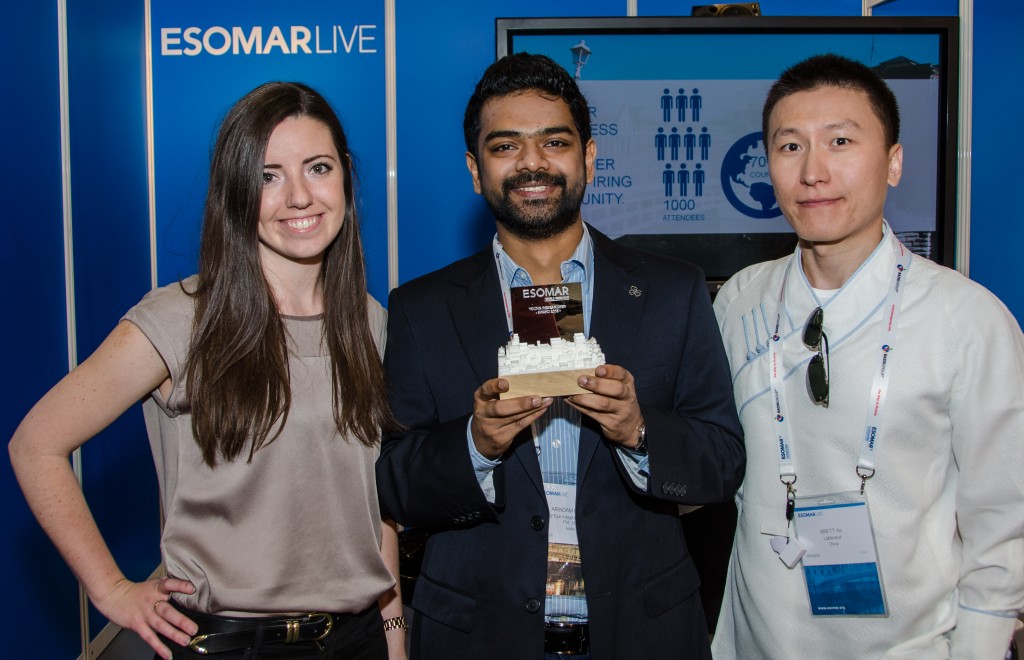Danielle Todd shares with us how she experienced ESOMAR Congress 2015 in Dublin as a young researcher. This is the second of a 3-piece blog series.
Day Two of Congress, with the ‘Future is Now’ session, Young Researcher Awards and even more revelations, very much focused on the future of our industry. Before the sessions began, I spent the morning really absorbing all the exhibitor hall had to offer. The booth marked ‘Researching a career’ drew my eye immediately.
A project borne of out cross agency collaboration between MRS, Chime Insight & Engagement and ENI, and being steered by several researchers like Caroline Bates and Mark Hirst amongst others, who are passionate about utilising and promoting great talent. With this stand nestled among the hard fought for supplier stands, I get the very strong sense that ESOMAR is keen to ensure both attracting and nurturing new talent is high on their agenda as well. Indeed, the fact that my running for ESOMAR Council last year, as a young researcher (with less than 2 years experience in the industry) was even possible, is testament to how passionately ESOMAR feels about encouraging young researchers to help shape their industry. What other profession gives you that opportunity?
Today’s presentations kicked off with what may be my favourite of the whole Congress: ‘Future Gaze’ by two brilliant speakers from InSites Consulting. Katia Pallini and Annelies Verhaeghe talking about GenZ. This generation demands more visual communication and InSites nicely represented their world by introducing their topic via a music-pumping video to wake up the audience. We learnt this generation rebukes the traditional ways of both experiencing the world and working. GenZ exists across multiple platforms, communicates instantly, processes multitudes of data immediately and therefore are able to deliver insight more quickly than ever before.
What does this mean for research? The formal briefing moment will disappear. GenZ favours instant form of social engagement, striving for individualisation and personalisation through all parts of their lives. This GenZ has finally shed the shackles of previous generations, binary definitions of gender or work/life balance are obsolete. Luckily for us, InSites left us with some learnings we can borrow from this generation in our work now. We can make surveys snappier, shorter, more engaging; we can be smarter about integrating data as well as presenting findings in more visual way. Surprise and delight our clients, deliver something they don’t expect.
Ernest Collings of MESH was up next with 20 predictions for 2020: shocking revelations about the future. I thoroughly enjoyed Ernest’s session for two reasons; he admirably chose to do his session in a PechaKucha format (which is a challenging feat for even the most seasoned speakers) and he presented bold predictions for the future. Keen not to steal Erny’s thunder – you should read the paper – the two revelations I found most pertinent were:
- In the future, we won’t interview people, we will interview things – as technology advances, becoming more personalised to deliver to our needs, it means our smart and connected devices will know more about us than we do ourselves. Mining this data could lead to rich understanding without a single in-depth interview or survey taking place!
- There will be a new path to purchase from your car to your living room. Now we will research, widen or narrow our consideration set, and purchase all on various connected devices wherever we are at that time.
I was inspired to see several younger researchers not only speaking, but presenting in engaging and highly visual ways. We hear often how this generation are digital natives but they are research natives also; they naturally consume a wide range of data from various sources, are apt story-tellers and look perfectly at home on the stage. As ESOMAR knows well, we need more of this sort of thing at Congress!
The theme of the brilliance of junior talent continued, with Insights 2020 presenting their findings. They told us that hiring the right talent is a key focus for our insights and analytics industry. It is vital to ensure teams have the right mix of people and skills to survive the future. We will need to be more agile and think and work across multiple platforms; young talent will be more naturally predisposed to think in this way.
Leading nicely on from the focus on key talent, we had the ‘career in revelations’ session led by Caroline Bates, Liz Norman, Jake Steadman of Twitter, Kristin Luck, Emily Kettle, Facts International and Chris Wallbridge, Thruth.
Chime Insight and ENI have collaborated to produce some great research (check out http://researching-a-career.blogspot.co.uk/, for more details) based around understanding and addressing the challenges we face recruiting talent to our industry. This presentation gave us the next step on how to solve this problem. We learnt that attraction, outreach, access and mentoring are four key pillars of producing the stars of tomorrow. Especially close to my heart was Kristin Luck discussing mentoring, and in particular the Women in Research mentoring scheme. As an enrolled mentee, I can testify this programme has been invaluable to me in navigating my career. I meet with my mentor, a senior client side researcher with a wealth of experience, around once a month to discuss all things positive and negative, both in my personal life and my work life. I always leave these Skype calls, meetings and dinners feeling armed with great advice, tips and encouragement to face any problem and achieve any goal. Go to www.womeninresearch.com for more information.
This session ended with a call to action. For all senior researchers to step up and commit themselves to visiting one university to demonstrate how great our industry is, or mentoring one junior to help keep funnelling great talent into the industry we all love.
Next up was the Young Researcher of the Year Award, with Samantha Bond, Arindam Mohanty and Brett Ao. Samantha was up first taking us through the revolutionary global movement Millennials are instigating in the workplace. This generation wants to work for themselves, prizing personal fulfilment rather than simply monetary gain in their careers. Samantha warns us that to attract these great minds to any agency, we should offer freedom and fluidity in the workplace, as is it important to recognise this workforce is looking for a way of life, not simply a job.
Arindam Mohanty then weaved a beautiful and enchanting story around the intergenerational stories that can unfold on the Indian railways. Through the transience and anonymity of the railways, we have a window into stories we wouldn’t otherwise see. Through this ‘ethnography on wheels’ we can map the scale and depth of the Indian experience.
Brett Bo ended the session by teaching us of the importance of a holistic understanding of the snack category in such a diverse country such as China. In this country, a snack can be anything ‘small’ and ‘scattered’, so how do you launch a successful new product? Cultural understanding. Brett demonstrated how in order to ‘boss the category’ we must first understand the culture behind it.

I applaud anyone who puts herself or himself forward as a Young Researcher nominee. As a former finalist, I understand the pressure and nerves of presenting in front of a room full of experts, but I was champing at the bit for our finalists to take their thinking that one step further. A key theme of Congress was that this industry belongs to the stars of tomorrow, with their digital acumen and connected ways of thinking. While all presentations were very interesting, and extremely well delivered, I was keen to hear if Samantha took her thinking one step forward to her own career; perhaps trialling some new ways of working in Northstar to channel this Millennial mind-set for the benefit of her own company. Or if Brett applied his rich cultural understanding to helping a brand launch a new snack in China. For me, Arindam was a worthy winner, surprising and delighting us with both beautiful storytelling and revelations. Congratulations to all brave and talented finalists!
The day was rounded off with an awards dinner, held in the historic and beautiful Royal Dublin Society. A room filled with champagne, Irish drumming and dancing as well as a wonderful three-course meal for hundreds of market researchers from 75 countries. Hats off to ESOMAR for a flawlessly organised and executed evening!
Danielle Todd is Senior Research Executive at Relish Research




